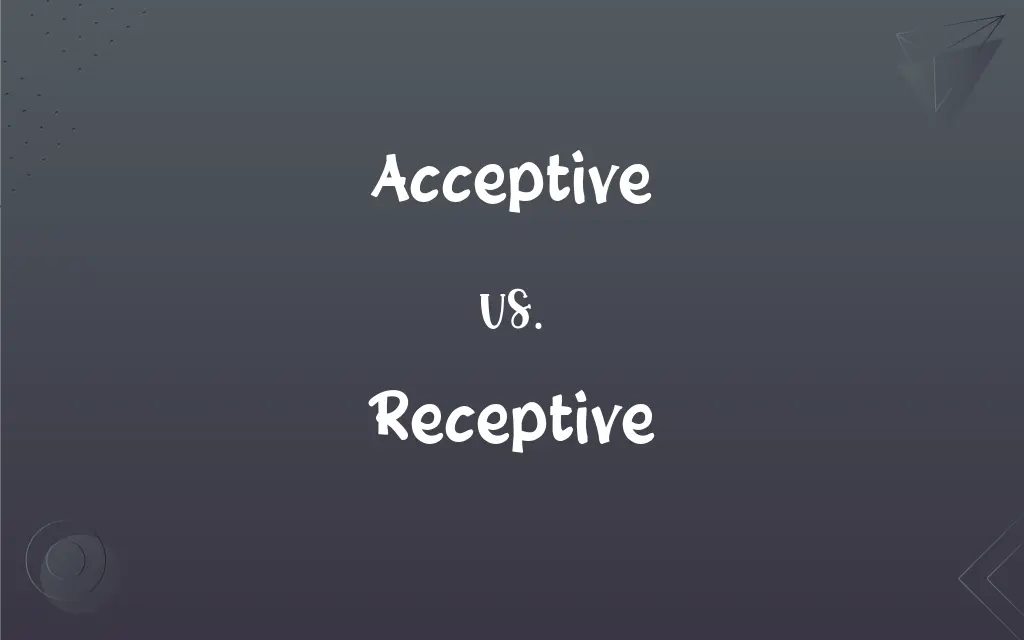Acceptive vs. Receptive: What's the Difference?
Edited by Harlon Moss || By Janet White || Updated on November 16, 2023
Acceptive generally pertains to a willingness to accept while Receptive refers to being open or willing to receive, often involving ideas or suggestions.

Key Differences
Acceptive typically denotes a state or quality of being accepting, often without opposition or question. Receptive, on the other hand, emphasizes a readiness or willingness to receive and consider something, often new ideas or concepts.
Acceptive may imply a certain passiveness, simply allowing things to be as they are or accepting them without further investigation. Receptive carries a nuance of not just allowing but being open and willing to actively receive or entertain new thoughts.
Often, being acceptive is perceiving things positively or allowing them without resistance. Receptive involves more of a capacity or inclination to receive new ideas and can indicate a mental openness to considering or understanding new concepts.
Acceptive can be perceived as an agreement or consent towards something presented, indicating agreement without active opposition. Receptive usually represents an openness to receiving inputs and signals without necessarily agreeing with them.
In some contexts, acceptive can be synonymous with agreeable or consenting, embracing what is presented without objection. Receptive goes beyond mere acceptance by implying a mental and emotional readiness to engage with something new or different.
ADVERTISEMENT
Comparison Chart
Basic Definition
Willing to accept or consent
Open to receiving or considering
Implied Activity Level
Can be passive
Actively open
Association with Ideas
May not entertain new ideas
Open to new ideas
Emotional Connotation
Consenting, agreeing
Willing, open-minded
Involvement Implication
Doesn’t imply deep involvement
May imply engaging involvement
ADVERTISEMENT
Acceptive and Receptive Definitions
Acceptive
Tending to accept or allow what is presented.
His acceptive nature made him popular among friends.
Receptive
Open to new ideas or arguments.
A receptive mind is fertile ground for innovation.
Acceptive
Exhibiting willingness to embrace new situations.
His acceptive demeanor towards change was refreshing.
Receptive
Willing to consider or accept new suggestions and ideas.
The manager was not receptive to the proposed changes.
Acceptive
Not resistant or opposing.
The acceptive audience clapped even for the mediocre performance.
Receptive
Open and responsive to ideas, impressions, or suggestions.
Artists need to be receptive to the world around them.
Acceptive
Agreeing or consenting without protest.
She was always acceptive of her team's decisions.
Receptive
Willing or inclined to receive suggestions.
She was always receptive to feedback from her peers.
Acceptive
Characterized by approval or acceptance.
Her acceptive nod encouraged him to continue speaking.
Receptive
Able to receive signals or stimuli.
The radio is receptive to various broadcast frequencies.
Acceptive
Fit for acceptance.
Receptive
Capable of or qualified for receiving.
Acceptive
(obsolete) Ready to accept.
Receptive
Ready or willing to receive favorably
Receptive to their proposals.
Acceptive
Receptive.
Receptive
(Linguistics) Of or relating to the skills of listening and reading.
Acceptive
Fit for acceptance.
Receptive
Receiving or ready to receive penetration in sexual intercourse.
Acceptive
Ready to accept.
Receptive
Receiving or ready to receive male gametes or nuclei during sexual reproduction
A receptive hypha.
Receptive stigmas.
Acceptive
Inclined to accept rather than reject;
She was seldom acceptive of my suggestions
Receptive
Capable of receiving something.
Acceptive
Accepting willingly;
Acceptive of every new idea
An acceptant type of mind
Receptive
Ready to receive something, especially new concepts or ideas.
Receptive
(botany) Of a female flower or gynoecium: ready for reproduction; fertile.
Receptive
{{lb|en|neurology
Receptive
(zoology) Of a female animal (especially a mammal): prepared to mate; in heat, in oestrus.
Receptive
Having the quality of receiving; able or inclined to take in, absorb, hold, or contain; receiving or containing; as, a receptive mind.
Imaginary space is receptive of all bodies.
Receptive
Open to arguments, ideas, or change;
Receptive to reason and the logic of facts
Receptive
Ready or willing to receive favorably;
Receptive to the proposals
Receptive
Of a nerve fiber or impulse originating outside and passing toward the central nervous system;
Sensory neurons
FAQs
What is the primary definition of Receptive?
Receptive describes a willingness or readiness to receive and consider new ideas, suggestions, or stimuli.
Is being Receptive a positive trait?
Often, yes. Receptiveness is typically viewed positively as it implies open-mindedness and a willingness to consider others’ ideas.
Can Receptive describe a quality in objects?
Yes. For example, a material can be receptive to magnetism or a device can be receptive to signals.
Is Receptive related to physical reception?
It can be, as in the case of a device being receptive to signals, but often it is used to describe mental or emotional openness.
Can something be receptive without being accepting?
Yes. Being receptive involves openness to considering new ideas but doesn’t necessarily mean they’re accepted.
Can a person be Acceptive but not Receptive?
Potentially, yes. Someone may accept an idea (be acceptive) without being open to new ones (receptive).
Are Acceptive and Receptive synonyms?
While similar, they aren’t exact synonyms. Acceptive implies agreement, while receptive implies openness without necessary agreement.
Is Receptiveness a more active state than Acceptiveness?
Generally, yes. Receptive implies an active openness to considering new things, whereas acceptive might be more passive.
In what context might Acceptive and Receptive be used interchangeably?
In contexts where willingness to consider or take in new ideas is being discussed, they might be used interchangeably, but careful attention to nuance is important.
Is there an antonym for Acceptive?
Yes, nonacceptive or rejective can serve as antonyms.
Can you give an example of a sentence using both words?
"While being generally acceptive of traditional practices, the community was also receptive to innovative, sustainable technologies."
Which word is more commonly used, Acceptive or Receptive?
Receptive is more commonly used in everyday English language.
Can Receptive be used in a business context?
Yes. For instance, a company might be receptive to new strategies or market trends.
Can Acceptive refer to a physical state?
Rarely. It’s predominantly used to describe mental or emotional states or attitudes.
Can Receptive be used to describe cultures or groups?
Absolutely. A culture might be described as receptive if it is open to new ideas and influences.
About Author
Written by
Janet WhiteJanet White has been an esteemed writer and blogger for Difference Wiki. Holding a Master's degree in Science and Medical Journalism from the prestigious Boston University, she has consistently demonstrated her expertise and passion for her field. When she's not immersed in her work, Janet relishes her time exercising, delving into a good book, and cherishing moments with friends and family.
Edited by
Harlon MossHarlon is a seasoned quality moderator and accomplished content writer for Difference Wiki. An alumnus of the prestigious University of California, he earned his degree in Computer Science. Leveraging his academic background, Harlon brings a meticulous and informed perspective to his work, ensuring content accuracy and excellence.
































































